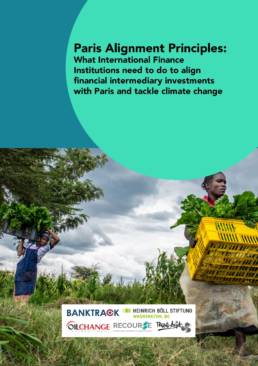Today, Recourse and partner organisations BankTrack, Heinrich Boell Foundation Washington DC, OilChange International, and TrendAsia published a new report highlighting principles and actions that International Financial Institutions (IFIs) need to observe in order to align their financial intermediary investments with the goals of the Paris Agreement on Climate Change.
The report comes at a time when pressure is mounting on IFIs to ensure their operations are consistent with Paris goals as the deadline for alignment nears. Multilateral Development Banks (MDBs) committed to fully align their operations with Paris with a deadline of July 2023 for direct finance and a later deadline of 2025 for indirect investments. The International Finance Corporation (IFC) has promised to consult publicly on its Paris alignment methodology.
The report points to coal projects funded by the IFC through bank intermediaries in the Philippines and Indonesia, and raises red flags about potential oil and gas exposure in East Africa and Vietnam.
“Financial intermediary lending remains a potentially big loophole where fossil fuel financing continues to flow,” said Mark Moreno Pascual from Recourse. “There needs to be greater transparency in financial intermediary lending in order for civil society and project-affected communities to hold IFIs accountable for investments detrimental to people and planet.”
Andri Prasetiyo from Trend Asia based in Indonesia said: “The fact that the IFC’s first green equity client financed the Java 9 and 10 coal complexes in Indonesia without IFC even knowing is reason enough for IFIs to seriously think about and review their lending practices. We demand accountability from the World Bank for the harms they have caused, and corrective measures must be put in place to ensure this does not happen again and justice is served for local communities who bore the brunt of the consequences.”
The report calls for an end to public finance for fossil fuels; boosted support for sustainable renewable energy and a just transition; as well as a rights-based approach to all investments, to ensure they do no harm and protect and promote the rights of marginalised communities.
Foto: Melvinas Priananda/Trend Asia


